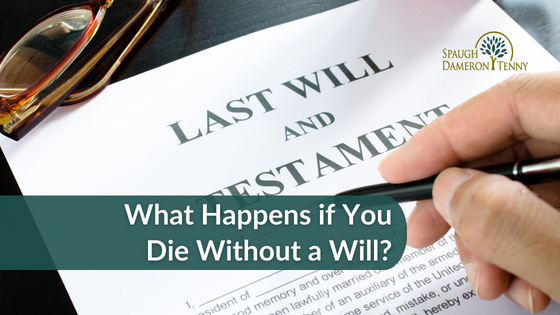A Will allows you to control where things are distributed after you’ve passed. Dying without a Will means the state in which you live, based on its rules, will dictate who receives your assets.
If you die without a Will, you have inherently relinquished control of dictating who will benefit from your wealth.

When a person dies without having written a Will, their estate is considered to be without a legal document to determine who will receive their assets. This is called intestate or intestacy. If you die without a Will, you are known to have died intestate. Keep in mind that the laws of intestacy vary from state to state.
Two areas that are most commonly affected if you do not have a Will when you die, include:
As mentioned above, each state has its own established process determining who will benefit from the deceased person’s assets.
Assets will typically be given to their surviving spouse, children, parents, and siblings but not always in the increments they would have preferred. For example, if you die with a spouse and two surviving children in North Carolina, your assets will be divided into thirds.
When someone dies without a Will, their assets are held by the court system until they’ve been able to review all the details of their estate. The court then applies its state intestacy laws to decide where a person’s possessions will be allocated.
This process is typically time-consuming and exhaustive for the surviving family members but can be avoided.
The probate court will appoint a personal representative or executor to oversee the distribution of the decedent’s property. Since the assets are going through the probate process, this subjects the deceased person’s information to public record and allows creditors to file claims.
The court system will be responsible for determining the rights of your children if you pass away without creating a Will.
The court system empowers a state judge to make guardianship elections for the children. The authorities strive to make sure that a child's care is in their best interest, but they lack an understanding of the particular child and their family situation.
Dying without a Will can add unnecessary stress and suffering through an already difficult time for the deceased’s family members.
Without a Will, there is no clear direction or plan in place for how assets and belongings will be distributed, leaving family members to navigate the legal system and figure it out on their own. Creating a Will and other estate planning documents can give you and your family peace of mind, knowing that your wishes will be carried out and your legacy will be protected.
Estate planning is not just for the wealthy, it's for anyone who wants to ensure their loved ones are taken care of and their assets are distributed as they wish.
If you’ve not done estate planning and are unsure where to start, connect with one of our financial planners today. Our trusted and experienced team can help you assess your financial situation, determine your goals and priorities, and create a comprehensive plan that meets your needs.
With Spaugh Dameron Tenny in your corner, you can take the first step toward securing your future and protecting your family's well-being.
CRN202604-4253909

Jordan Bilodeau, CFP®, CEPA, is the Director of Planning & Strategy at Spaugh Dameron Tenny, where he leads firmwide planning initiatives and helps clients navigate complex financial decisions. With experience in portfolio design, tax strategies, and business succession planning, Jordan works with executives, physicians, dentists, and successful retirees to coordinate every aspect of their financial lives. He holds both the CERTIFIED FINANCIAL PLANNER® and Certified Exit Planning Advisor designations and has a Master’s degree in Wealth and Trust Management, providing tailored guidance for clients.
Inheriting wealth can evoke emotion, responsibility, and logistical challenges in ways few other life events do. Families often expect the financial ...
Read More →When someone passes away, the emotional and logistical challenges can seem overwhelming. Most families focus on the major estate items, but several ...
Read More →When it comes to planning for the future, many families want a way to stay organized, protect what they have built, and make passing wealth to the ...
Read More →